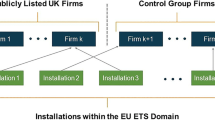Abstract
The Chinese government has been worrying about the outflow of profit of the multinational corporations. Using data from various sources, this paper evaluates the inhibitory effect of bilateral tax treaties on profit shifting behavior of Chinese multinationals. The paper finds strong evidence for profit shifting out of China due to corporate tax differences, as well as statistically significant inhibitory effect of tax treaties. Besides, the profit shifting activities mainly exist in non-manufacturing industries.


Similar content being viewed by others

Data availability
The dataset generated during the current study is not publicly available as it contains proprietary information that the authors acquired through a license. Information on how to obtain it and reproduce the analysis is available from the corresponding author on request.
References
Bartelsman, E. J., & Beetsma, R. M. W. J. (2003). Why pay more? Corporate tax avoidance through transfer pricing in OECD countries. Journal of Public Economics, 87(9), 2225–2252.
Beck, T., Levine, R., & Levkov, A. (2010). Big bad banks? The winners and losers from bank deregulation in the United States. The Journal of Finance, 65, 1637–1667.
Beer, S., de Ruud, M., & Liu, L. (2020). International corporate tax avoidance: a review of the channels, magnitudes, and blind spots. Journal of Economic Surveys, 34(3), 660–688.
Beer, S., & Loeprick, J. (2021). Too high a price? Tax treaties with investment hubs in sub-Saharan Africa. International Tax and Public Finance, 28, 113–153.
Beuselinck, C., Deloof, M., & Vanstraelen, A. (2015). Cross-jurisdictional income shifting and tax enforcement: Evidence from public versus private multinationals. Review of Accounting Studies, 20(2), 710–746.
Brajcich, A., Friesner, D., & Schibik, T. (2016). Do US pharmaceutical companies strategicallyshift income to international affiliates? Multinational Business Review, 24(1), 8–24.
Buettner, T., & Wamser, G. (2013). Internal debt and multinational profit shifting: Empirical evidence from firm-level panel data. National Tax Journal, National Tax Association, 66(1), 63–95.
Cristea, A., & Nguyen, D. (2016). Transfer pricing by multinational firms: New evidence from foreign firm ownerships. American Economic Journal: Economic Policy, 8(3), 170–202.
Davies, R. B., Martin, J., Parenti, M., & Toubal, F. (2018). Knocking on tax haven’s door: Multinational firms and transfer pricing. Review of Economics and Statistics, 100(1), 120–134.
Devereux, M.P. (2007). The impact of taxation on the location of capital, firms and profit: A survey &empirical evidence. (Oxford University Centre of Business Taxation Working Paper No. 07/02).
Dischinger, M., Knoll, B., & Riedel, N. (2014). The Role of Headquarters in Multinational Profit Shifting Strategies. International Tax and Public Finance, 21(2), 248–271.
Dischinger, M., & Riedel, N. (2011). Corporate taxes and the location of intangible assets within multinational firms. Journal of Public Economics, 95(7–8), 691–707.
Dyreng, S., Lindsey, L., Markle, K., & Shackelford, D. (2015). The effect of tax and non tax country characteristics on the global equity supply chains of US multinationals. Journal of Accounting and Economics, 59, 182–202.
Egger, P. H., Strecker, N. M., & Zoller-Rydzek, B. (2020). Estimating bargaining-related tax advantages of multinational firms. Journal of International Economics, 122, 103258.
Griffith, R., Miller, H., & O’Connell, M. (2014). Ownership of intellectual property and corporate taxation. Journal of Public Economics, 112, 12–23.
Grubert, H., & Mutti, J. (1991). Taxes, tariffs and transfer pricing in multinational corporate decision making. The Review of Economics and Statistics, 73(2), 285–293.
Hanlon, M., Maydew, E. L., & Thornock, J. R. (2013). Taking the long way home: U. S. tax evasion and offshore investments in U. S. equity and debt markets. Journal of Finance, 70(1), 257–287.
Hines, J., & Rice, E. (1994). Fiscal paradise: Foreign tax havens and American Business. The Quarterly Journal of Economics, 109, 149–182.
Huizinga, H., & Laeven, L. (2008). International profit shifting within multinationals: A multi country perspective. Journal of Public Economics, 92(5–6), 1164–1182.
Janský, P., Láznička, J., & Palanský, M. (2020). Tax treaties worldwide: Estimating elasticities and revenue foregone. Review of International Economics., 00, 1–43.
Johannesen, N. (2014). Tax evasion and Swiss bank deposits. Journal of Public Economics, 111(2), 46–62.
Johannesen, N., & Zucman, G. (2014). The end of bank secrecy? An evaluation of the G20 tax haven crackdown. American Economic Journal: Economic Policy, 6(1), 65–91.
Klassen, K., & Laplante, S. K. (2012). The effect of foreign reinvestment and financial reporting incentives on cross-jurisdictional income shifting. Contemporary Accounting Research, 29(3), 928–955.
Maffini, G., & Mokkas, S. (2011). Profit shifting and measured productivity of multinational firms. Oxford Bulletin of Economics and Statistics, 73(1), 1–20.
Rego, S. O. (2003). Tax-avoidance activities of U.S. multinational corporations. Contemporary Accounting Research, 20(4), 805–833.
Richter, B. K., Samphantharak, K., & Timmons, J. F. (2009). Lobbying and taxes. American Journal of Political Science, 53(4), 893–909.
Slemrod, J. (2004). The economics of corporate tax selfishness. National Tax Journal, 57(4), 877–899.
Weyzig, F. (2013). Tax treaty shopping: Structural determinants of foreign direct investment routed through the Netherlands. International Tax and Public Finance, 20(6), 910–937.
Funding
No funding was received for conducting this study.
Author information
Authors and Affiliations
Corresponding author
Ethics declarations
Conflict of interest
The authors have no relevant financial or non-financial interests to disclose.
Additional information
Publisher's Note
Springer Nature remains neutral with regard to jurisdictional claims in published maps and institutional affiliations.
About this article
Cite this article
Xue, M., Zhang, Y. Did tax treaties restrain the profit shifting of Chinese multinationals?. Rev World Econ (2024). https://doi.org/10.1007/s10290-024-00526-8
Accepted:
Published:
DOI: https://doi.org/10.1007/s10290-024-00526-8



